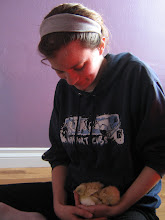Seriously. Look around you. I bet you can find a bunch of plastic. We buy food in plastic, store food in plastic, wrap things in plastic, chew on plastic (any gum chewers out there?), constantly throw away plastic... Yet, most people don't think about this much, I don't believe. I know I didn't until recently, and now I'm surprised I hadn't heard more about plastic before! I'd like to share some things that I've learned. I give links to give you more to read and consider, but they aren't the only things I have read about these topics. If you are interested, go out and find more!
What is plastic made out of?
According to Wikipedia, the raw materials to make most plastics come from petroleum and natural gas.
Why is plastic such a big deal?
A few reasons. First of all, in our society, we use plastic to store our food in and eat our food out of regularly. The thing is, as far as I can tell, we aren't sure that any plastic is completely safe. Dangerous chemicals can leach into food and then stick around in our bodies. Even plastics that we
know are harmful are still used to hold food! For example, the plastic that makes styrofoam is called polystyrene, and it is known to have negative effects on the body. (
http://www.ejnet.org/plastics/polystyrene/health.html) Yet, I bet it is the rare person in our country who has never drank out of a styrofoam cup or eaten take-out from a styrofoam container.
The second reason that I will give is that the amount of plastic that we use creates a massive amount of waste. Massive. More on this later.
OK, we use a lot of plastic, but doesn't recycling solve the waste issue?
Unfortunately, no! We view recycling as a closed loop. For example, we buy a plastic yogurt container, use it, put it in the recycling, and assume that the container can be made into another yogurt container. There are two big problems with this. One, plastic is usually "downcycled." This means that when it is recycled, you get a lower quality plastic. In particular, from what I've read, food-grade plastic often does not recycle to be food-grade plastic. That means that a lot of the plastic used to package food is brand-new plastic! Also, eventually plastic is unable to be recycled any more. (
http://planetgreen.discovery.com/work-connect/green-glossary-downcycling.html)
What problems are there from plastic waste then?
First of all, a huge problem is that plastic is largely not biodegradable. Whether it is on the land or in the water, it just sits there. It may eventually break into tiny pieces, but the plastic is still there. I think that a lot of people realize that our landfills are huge, and they know that it's a sad thing to have piles of garbage around the planet. However, I think that the heartbreaking truth about plastic remains largely unknown. Plastic is showing up everywhere in our oceans. In some places, like the Great Pacific Garbage Patch (
http://www.cdnn.info/news/article/a071104.html), there can even be a trail of hundreds of miles of plastic. People have studied this phenomena, and they have found that regardless of where they are, they can quickly find plastic in the ocean. Sea creatures are ingesting the little pieces of plastic that look close to their natural food, plankton, and we don't necessarily know how these petroleum-based chemicals will affect them or the creatures up the food chain from them (including humans!) Additionally, dead birds are being found with their bellies full of large, and clearly lethal, plastic pieces.
To get a clearer picture of the large problem of trash in the sea, please watch this video:
I'm convinced that this is a problem, but what can I do?
First of all, I'd recommend not getting overwhelmed or panicking. Worrying doesn't solve problems. :) I'll list some basic ideas to consider, and I recommend finding websites that talk about the issue and ideas for solutions. For example,
http://myplasticfreelife.com/ is a blog that is dedicated to the problem of plastics. Here are some good first steps:
1) Get a reusable water bottle and reusable shopping bags, and remember to use them! Stainless steel watter bottles are widely available, and there are many options for shopping bags including mesh and canvas styles.
2) Avoid buying packaged food. Head to the produce section for loose produce, and go to the bulk section to be amazed by the options that you have! Of course, these options make the most sense if you take reusable bags that you can make or buy!
3) Buy less and/or buy used. This is good for the pocketbook, too. :)
4) Consider glass as a good alternative when buying packaged food or food storage containers. It is easily recycled, and you will know that plastic isn't leaching into your food. I have started saving glass jars instead of recycling them, and they work great for food storage.
5) Bring your own mug if you get coffee.
6) Consider using cloth diapers and menstrual products.
In general, I think that just being aware of the plastic that you are using will help you to consider what to work on. People tend to be creative! Use your brain, and you'll be amazed at what you can accomplish! Feel free to comment if you have some other good ideas that I failed to mention.
Thanks for reading this, and I hope that you are inspired to live a love-filled, intentional life by working to reduce your part in the problem of plastic.
